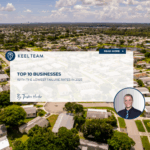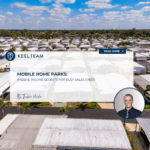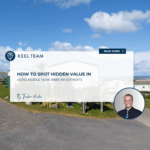Cash Flow vs Appreciation: The Real ROI in Mobile Home Parks

Mobile home park investing has gained attention as a strong alternative investment. Investors often debate whether cash flow or appreciation matters more when evaluating returns. Both play a role in the overall return on investment (ROI), but the balance between them can impact long-term gains.
Understanding the difference between the two can help investors make informed decisions. This guide explores how each factor contributes to ROI, the risks involved, and how investors can structure deals to maximize their return potential.
Understanding Cash Flow in Mobile Home Park Investing
Cash flow refers to the net income an investor earns after covering all operating expenses. In mobile home park investing, this typically comes from lot rent payments. Since mobile home parks have relatively low operating costs compared to other real estate investments, they often generate strong cash flow.
How Cash Flow Is Calculated
It’s determined by subtracting expenses from rental income:
Gross Rental Income – Operating Expenses – Debt Payments
Expenses may include:
- Property management fees
- Taxes and insurance
- Utilities (if not passed to tenants)
- Maintenance and repairs
- Marketing and administrative costs
A mobile home park with stable tenants and low vacancy rates will generally have consistent income. Investors who prioritize immediate returns may focus on acquiring mobile home parks with strong income potential.
Download our FREE eBook on the Top 20 things to know BEFORE investing in mobile home parks!
Why Investors Value Cash Flow
It plays a crucial role in mobile home park investing because:
- It provides consistent income. Investors can use it to cover loan payments, reinvest in the mobile home park, or generate passive income.
- It typically offers stability in uncertain markets. Even during market downturns, steady cash flow can help investors manage financial risk.
- It creates flexibility. Positive cash flow can give investors the ability to reinvest in improvements or acquire additional mobile home parks.
However, relying only on cash flow may limit long-term wealth-building potential. This is where appreciation comes into play.
How Appreciation Impacts Mobile Home Park ROI
Appreciation refers to the increase in a mobile home park’s value over time. Investors benefit from appreciation when they sell the property for more than they originally paid.
Factors That Influence Mobile Home Park Appreciation
- Market Demand – As affordable housing becomes more scarce, demand for mobile home parks may continue to rise, driving up property values as a result.
- Rent Increases – Higher lot rents can improve net operating income (NOI), which directly impacts its valuation.
- Operational Improvements – Enhancing infrastructure, adding amenities, and improving management can increase a mobile home park’s desirability and value.
- Interest Rate Changes – Lower interest rates often lead to higher property values, as investors are likely willing to pay more for strong cash-flowing assets.
- Zoning & Land Use Restrictions – A limited new supply of mobile home parks in certain markets may drive up the value of existing properties.
The Role of Cap Rates in Appreciation
Appreciation is often measured by the capitalization rate (cap rate), which is calculated as:
Net Operating Income ÷ Purchase Price = Cap Rate
If NOI increases and cap rates remain stable, a mobile home park’s value typically rises. For example, if an investor increases NOI from $200,000 to $250,000 in a market with a 7% cap rate, the property’s value could increase from $2.85 million to $3.57 million.
Comparing Cash Flow and Appreciation: What Matters More?
Both contribute to ROI, but their importance varies depending on an investor’s goals.
When to Prioritize Cash Flow
- Investors seeking immediate income – Those who rely on real estate for passive income may focus on strong cash flow.
- Lower-risk strategies – Mobile home parks with steady occupancy and strong cash flow can help reduce risk exposure.
- Shorter investment horizons – Investors planning to hold a mobile home park for a limited period may prioritize cash flow over long-term appreciation.
When to Focus on Appreciation
- Long-term wealth building – Investors willing to hold onto a mobile home park for several years may benefit from rising property values.
- Value-add opportunities – Mobile home parks with room for rent increases or operational improvements may see higher appreciation potential.
- Markets with strong demand – In areas with high population growth and limited affordable housing, appreciation may play a bigger role in ROI.

Maximizing ROI: The Best of Both Worlds
Many mobile home park investors aim for a balance between cash flow and appreciation. Here are some strategies to optimize both:
1.) Buy Below Market Value
Acquiring mobile home parks at a discount typically allows investors to benefit from both immediate cash flow and long-term appreciation.
2.) Improve Operations
Reducing expenses, filling vacancies, and implementing better management can increase NOI, improving both cash flow and property value potential.
3.) Add Revenue Streams
Additional income sources, such as laundry facilities, storage rentals, or utility bill-backs, can enhance cash flow while also increasing the mobile home park’s value potential.
4.) Consider Financing Terms
Lower interest rates or creative financing options can help improve cash flow while allowing appreciation to build over time.
5.) Choose the Right Market
Investing in locations with strong rental demand and limited mobile home park supply can lead to both stable income and long-term value growth potential.
Final Thoughts
Cash flow and appreciation both play a role in mobile home park investing, but their importance depends on an investor’s strategy. Some may prioritize steady income, while others focus on long-term value growth. The best approach often involves a mix of both—using cash flow to sustain operations while positioning for appreciation over time.
By understanding how each factor contributes to ROI, investors can likely make informed decisions that align with their financial goals. Whether focusing on immediate income or long-term gains, mobile home park investing offers opportunities for those willing to manage assets strategically.
Are you looking for MORE information? Book a 1-on-1 consultation with Andrew Keel to discuss:
- A mobile home park deal review
- Due diligence questions
- How to raise capital from investors
- Mistakes to avoid, and more!
Disclaimer:
The information provided is for informational purposes only and is not investment advice or a guarantee of any kind. We do not guarantee profitability. Make investment decisions based on your research and consult registered financial and legal professionals. We are not registered financial or legal professionals and do not provide personalized investment recommendations.
View The Previous or Next Post
Subscribe Below 👇





